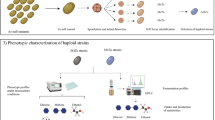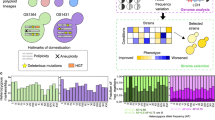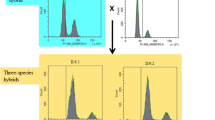Abstract
THE discovery of parasexuality in Aspergillus nidulans1 has led to the possibility of breeding strains of asexual micro-organisms for increased yields of a desired product2. It has been reported that in Penicillium chrysogenum a synthesized heterozygous diploid gave a higher yield of penicillin than either haploid parent, perhaps through an effect of heterosis2. It might sometimes be desirable therefore to use a heterozygous diploid of P. chrysogenum or other micro-organism in an industrial fermentation. A heterozygous diploid, however, does not breed true, but can give rise to segregants as the result of mitotic crossing-over or non-disjunction of chromosomes3. The rate of segregation may vary in different organisms, and if it were high then the accumulation of segregants during the course of a fermentation could have an adverse effect on the yield of a product. To prevent this or to avoid the consequences there are two possibilities, namely, to reduce the rate of segregation, or to select against segregants as they are formed.
This is a preview of subscription content, access via your institution
Access options
Subscribe to this journal
Receive 51 print issues and online access
$199.00 per year
only $3.90 per issue
Buy this article
- Purchase on Springer Link
- Instant access to full article PDF
Prices may be subject to local taxes which are calculated during checkout
Similar content being viewed by others
References
Pontecorvo, G., and Roper, J. A., Advances in Genet., 5, 218 (1953).
Sermonti, G., Ann. N.Y. Acad. Sci., 81, 950 (1959).
Kafer, E., Genetics, 46, 1581 (1961).
Sermonti, G., and Morpurgo, G., Sel. Sci. Pap. Ist. Sup. Sanit., 2, 416 (1959).
Morpurgo, G., and Sermonti, G., Sel. Sci. Pap. Ist. Sup. Sanit., 2, 427 (1959).
Sermonti, G., Sci. Rep. Ist. Sup. Sanit., 1, 462 (1962).
Macdonald, K. D., Hutchinson, J. M., and Gillett, W. A., Antonie van Leeuwenhoek, 30, 209 (1964).
Macdonald, K. D., and Pontecorvo, G., Advances in Genet., 5, 159 (1953).
Lein, J., Mitchell, H. K., and Houlahan, M. B., Proc. U.S. Nat. Acad. Sci., 34, 435 (1948).
Macdonald, K. D., Hutchinson, J. M., and Gillett, W. A., J. Gen. Microbiol., 33, 365 (1963).
Macdonald, K. D., Hutchinson, J. M., and Gillett, W. A., J. Gen. Microbiol., 33, 385 (1963).
Kafer, E., Genetica, 33, 59 (1962).
Author information
Authors and Affiliations
Rights and permissions
About this article
Cite this article
MACDONALD, K. Preservation of the Heterozygous Diploid Condition in Industrial Micro-organisms. Nature 204, 404–405 (1964). https://doi.org/10.1038/204404a0
Published:
Issue Date:
DOI: https://doi.org/10.1038/204404a0
Comments
By submitting a comment you agree to abide by our Terms and Community Guidelines. If you find something abusive or that does not comply with our terms or guidelines please flag it as inappropriate.



